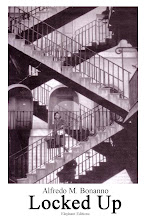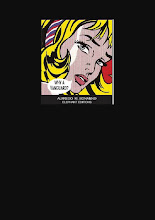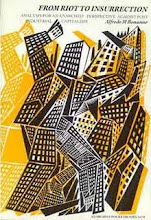Single issue printed by Ragusa anarchist group and Rivolta e Liberta anarchist group, Catania, July 1982. Published in English in Insurrection 1982
Why Comiso and Sicily
US imperialism's decision to place Cruise missiles in Comiso, in the centre of Sicily and the Mediterranean, is of an easily comprehensible military and strategic significance. Beyond the pro-American propaganda on a purely military and technical level which explains away this criminal decision as necessary to maintain an equilibrium with the Soviet missiles located on the Eastern frontiers of Europe, there is the fact that the very decision to build the missile base places itself in the optic of "preparing for war to maintain peace", forever the battle-cry of States who see in war a solution for the difficulties of domination and the continuation of exploitation.
Why Comiso? The answer is simple. As well as the strictly military ones there are economic and political reasons. Sicily, like Friuli, Campania and Sardinia - other areas chosen for the installation of atomic arms - are underdeveloped situations where three perspectives which are extremely favourable to capitalist dominion are foreseeable: a) intensive militarization of the territory to the point of reaching the closure of vast areas and even their "desertization"; b) organization of the struggle entrusted to the parties of the so-called left, with whom it is always possible to enter into dialogue and reach compromises; c) the great need for work, especially to avoid the prospect of emigration, which constitutes the most powerful blackmail for gaining mass consensus for the construction of the base.
These are the reasons for the choice of Comiso, and therefore also constitute an outline of the difficulties which any revolutionary struggle intending to subvert and defeat imperialism's project of building the base in Comiso will encounter.
The Sicilian reality
One of the levers of consensus which American imperialism can count on in Sicily is a certain mentality of delegation and fatalism which has inserted itself within the popular strata, especially the land labourers, and which finds a response in the mafia mentality which directs a power alternative to that of the State and which is often more efficient than the latter.
Local capitalism in Sicily contains a strong mafia content and has relations of patronage both with the intermediate strata and with the poorest of the population. These relationships substantially substitute State power, often seen as something far off and attainable only through the mafia intermediary.
The Municipality, the Province, the Region and the various organisms of assistance are used in an exclusively patronal context, serving to support a capillary and efficient structure of consensus. The bureaucracy has not yet reached the technological levels which characterize it elsewhere but still has the great Bourbon tradition transplanted from Piedmont which renders indispensable the element of mafia power manoeuvres and the connection between the political and economic mafias.
The industrial centers are anomalous, the greater part of the island working class not having an industrial specification but, having foreseen with the shrewdness characteristic of the poor that these installations were essentially capitalist traps, has not lost contact with their original peasant reality and at present find themselves in a situation which is neither working class nor belonging to the strata of peasant or farmhand. The weakness of the struggle from this area is striking.
The land labourers are basically the most combatant proletarian reality because they are linked to very difficult and often minimal situations of survival. The Communist Party, the Socialist Party and even the Christian Democrats are trying to involve the latent dissent of this strata in productive organizations such as cooperatives giving a prospect of continued work and guaranteeing consensus to make it safe for them to approach moments of greater social tension where they will not be able to keep the promises they have made. In the Ragusa area the present situation presents more complex characteristics due to the greenhouse productive sector where alongside the proprietor of a particularly profitable piece of land one finds the figure of the half day labourer, at the same time wage earner and small proprietor, nominally available for the struggle but substantially tied to the profit perspective, that of small property and therefore of compromises with power capable of guaranteeing or destroying the conditions which make the small peasant greenhouse cultivation productive.
The lumpenprolatariat strata fluctuates a great deal. It grows during the phases of increased unemployment in the building industry and when the possibility of work in the industrial sector diminishes. Farmhands and day labourers who are, within certain limits, available for the struggle, also enter this undoubtedly interesting strata. The source of income for the lumpenproletariat of the Ragusa area is extremely varied: from social assistance to sweat labour, from lay off money to work on the land, from microscopic commercial activities (street selling, small transporters, middlemen in improbable real estate affairs, etc), to simply survival. This strata is accustomed to poverty and suffering. In the Ragusa area the tendency towards the organized crime typical of the Palermo and Catania areas is more restricted and this could become a considerable area of absorption when, in the perspective of the realization of the base, the large mafia organizations intervene massively in the area.
The illusion of well-being
The argument of the wellbeing the Americans would bring to the Comiso area has been put forward parallel to that of the slight or inexistent dangers the installation of the base would represent.
This is an argument which always attracts the attention of the exploited. They can understand it because for them the concept of sacrifice-of any kind-is inherent to the concept of work. The State is far away, hence if one wants to obtain anything it is always necessary to refer to local patronage, but when the State approaches to propose a grandiose project, then the old illusions are rekindled.
The poor foster a hope of solving their problem, and the rich know with certainty that, even for only a period, their wealth will increase. The army of those who are neither rich nor poor tries to obtain the maximum utility from the occasion.
In this perspective the affair is proposed by international capitalism, local forces are mobilised by national capitalism who, in agreement with the mafia structures guarantee the functioning of patronage and lay the foundations for its concrete realization. The exploited try to extract all the benefit possible. The blackmail of precarious wages, commercial affairs, increase in sales for shopkeepers, reach insupportable levels.
The consequences of this are very serious: the breaking up of the cultural homogenity which alone could have guaranteed the progressive development of the struggle and therefore also collective well-being; upheaval of the local market (rise in prices of goods of prime necessity, rents, abnormal development in circulation of money and goods); militarisation of the territory which could even go as far as the closure of wide areas and periodical or continued blanket control, to the presence of large contingents of the army and various police forces; impossibility of exploiting even the minimal advantages guaranteed by the same irrational managerial and commercial activity; rationalism of the mafioso patrons on the Palermo model; presence of serious mafia conflicts resulting in hundreds of murders; rise in criminal activity (robberies, extortions, theft, violence of every kind); rationalisation and increase in heavy drug market (in the first place heroin and cocain); diffusion and mafia control of prostitution.
Social peace
The "peace" of the bosses is built on arms, declared and potential conflicts, missile installations, armies, police, military and mafia-type cultures. It is the peace of the graveyard. Along the road of capital's transformation from formal dominion to that of real dominion the contradictions typical of competitive capital are diminishing, leaving the perspective of profit at any cost in favor of increased State intervention in the economic field. This intervention transforms the conditions of economic competition, puts the profit objective into second place, rationalizes exploitation and centralizes domination which is camouflaged by the democratic and representative charade.
The production of value is subordinated to the production of social peace. Consensus becomes the principal industry around which the whole State machinery turns, exclusively directed towards guaranteeing international capitalism exploitation on a planetary level. The local problem passes into second place in the perspective of the equilibrium and projects of the multinationals. Assistance is gradually taking over from the logic of production.
But the solving of capitalism's contradictions, especially at a regional and local level, cannot be attained unless it goes beyond the conditions of present-day capitalism which are often backward. Social conflicts are still acute and can even worsen as a consequence of the need to progressively extend the project of real dominion to all parts of the world. The difficulties in the production of social peace are therefore still great. And it is in this direction that the efforts of those struggling against domination must address their efforts, against the State and against Capital. Our class enemy has a vested interest in preparing for the final extinction of any opposition and revolutionary dissent but to do that it must improve the conditions of exploitation which at present cause, among other things, one death every hour and one wounded every five minutes in Italy alone. This improvement will rationalize exploitation and therefore the class struggle will become more complex, but time is needed to put it into effect. In the meantime it will always be necessary for the bosses to oppose each other in the international clash both on the economic and the narrow military level. This tragically leads to nuclear decisions, atomic war decisions, and decisions such as genocide (Lebanon, Afghanistan, San Salvador, etc) which lead back to the problem of the level of the class struggle.
In this way capitalism works towards war while speaking of peace. It builds, sells and uses traditional and atomic arms, but affirms that it does so because there is no other way to safeguard social peace. The exploited have no interest in this "peace" of the bosses.
Those responsible
Limiting ourselves to the construction of the missile base at Comiso it is possible to identify a few basic responsibilities.
International capitalism and its national and local equivalent have an interest in the armed defense of their projects of domination. The NATO, in as far as it is a specific organism created for this defense, is the armed gendarme who intervenes to put a brake on situations which are dangerous for capital and to prevent situations of social conflict being created in perspective. To do this both military (coordination between different armies, new armaments, common exercises, deployment of military contingents), and political means are used.
In the political perspective the Christian Democrats are the party which has revealed itself to be incapable of undertaking the task of protecting the interests of international capital. For this reason, in the orbit of government, the Italian Socialist Party has been inserted, and has increasingly become the party of the Americans and the most suitable political force at a technocratic and managerial level for doing what the Christian Democrats -too tied to mafia patronage with a backward mentality-failed to do.
But the essential cover is supplied by the Communist Party. It is this party which takes charge of putting a brake on the rebellious impulse of the exploited, organizing the recuperation of every form of dissent, breaking up the combativity of the land labourers through the formation of cooperatives and other swindles such as participation in factory profits, channeling the quite legitimate hopes of those who have never had anything to cause them to lose their conflictual content. We have seen clearly how, in the case of Comiso, the gigantic party machinery has been put into action to develop a formal and platonic dissent through marches, petitions, and hunger strikes, all to prevent a real and effective dissent taking place based on occupation, sabotage, attacks on the bosses' interests, the preparation of the means to prevent the construction of the base.
Another strata which bears a strong responsibility in the project of robbery and death which is being planned for Comiso is that of the shopkeepers. Their miserable interest in increasing sales, of seeing dollars circulating instead of the usual few lire, has been exalted as a benefit which would be enjoyed by the collectivity of the whole area, while it is dramatically obvious that their personal and circumscribed interests would be heavily paid for by the poor if not other than by an immediate and considerable rise in prices from rents to goods of primal necessity. There can be no doubt that one of the obstacles to be contended with in the struggle will be precisely the organization of the shopkeepers in the area.
Another category who bears responsibility is that of the small proprietor who conformed immediately to the indications of struggle supplied by the CP, precisely because they are convinced that this strategy does not intend to do anything of any immediate real content. In fact the small proprietors, even those directly damaged by the construction of the base, want to prevent its construction, but this is subordinated to an eventual proposal of an indemnity allowance by the organs responsible. In other words their struggle is linked to an uncertain condition: first they want to see how the State and the Region behave, only then will they really be available to struggle and could go back on this if a proposal by the responsible bodies, should become convenient again.
But there is one last category which will bear a great responsibility should it not respond coherently to the proposals of the bearers of death: the category of workers, especially the labourers in the building sector, and even more the great number of unemployed who have deliberately been thrown into the gutter during the past few months in order to create a favorable disposition towards the base (bringing work and well-being!). The swindle is not difficult to understand. The consistency and duration of the work itself is practically minimal, the benefits to be drawn from it will have the same limited duration and soon be reabsorbed by the increase in prices, hence the solution would still be that of remaining unemployed or of leaving to swell emigration. One might just as well -impose one's own conditions right away, establishing the terms of the struggle immediately, making it impossible for the bearers of death to continue their blackmail. It is necessary to be very clear on this subject. Struggling immediately and efficiently, two results could be obtained: the construction of the base would be blocked and the bosses and politicians be obliged to find a solution to the problem of unemployment with other initiatives which will be realized more quickly the more effective the struggle against the base.
An organizational proposal
Our intervention in the reality of Comiso and the whole of the Ragusa area-in the towns of Ragusa, Vittoria, Modica, Ispica, Giarratana, Monterosso and the principal villages of the coastal region-which is still in course, can be divided into three phases and culminates with a proposal of self-managed organization.
The first phase has developed and is continuing to develop a direct contact with the different situations through meetings in the town squares and leafletting. The arguments chosen for the meetings and the drawing up of leaflets have been deliberately simplified, avoiding very detailed and complicated analyses in order to center the argument on one point: the construction of the base can be prevented, on the condition that the means suitable for doing so are used; the means suggested and put into practice by the Communist Party are not suitable for preventing the construction of the base. This aim will not be reached through colossal but ineffective marches, courageous but isolated hunger strikes or the signing of petitions which will be rendered useless by the swindles of power. Such means are fictitious means which do not really intend to prevent the construction of the base. It is necessary to employ harder and more effective ones. The bosses and their servants understand one language: that of fear. It is necessary therefore to frighten them, as has been done in the past. It is enough to think of the occupation of the land which has put an end to the injustices of the large landowners. It is therefore necessary to have recourse to the means of occupation, sabotage, hard frontal attack.
The second phase in our intervention is centered on the organization of the international anarchist conference which will take place in Comiso in the municipal sports ground on July 31 and August 1. It will be a fundamental occasion for the anarchist movement, along with the most sensitive area of the proletariat and lumpenproletariat, to go into the problem of the struggle against the base. From this conference should emerge indications of method, analytical indications and more general indications of struggles as the problem of Comiso runs the very great risk of isolation, i.e. of becoming closed as a specific struggle within a precise area of Sicily and within that kind of struggle which has as its point of reference antimilitarism, the struggle against war and against nuclear power. The passage to the generalization of interventions to other sectors, and therefore the discussion and examination of methods to be used in struggle against the base in Comiso can only be realized through an analytical and creative contribution of the movement as a whole.
The third phase is predominantly organizational and does not necessarily follow the first two but can develop parallel to them. Our aim is to suggest the creation (and therefore to contribute to creating) self-managed leagues against the Comiso base in the various localities, leagues which will be able to continue the struggle in first person, determining the characteristics of the conflict, decided by the various localities, leagues which will be able to continue the struggle in first person. In our opinion, and basing this on the results of the first phase of intervention, we are reasonably certain that a strong dissent exists in the various provinces of Ragusa and particularly in Comiso itself among the base of the CP concerning the methods of struggle suggested by this party. Moreover there also exists considerable dissent within the base of the Socialist Party who do not share the positions of Craxi and Lagorio, and this component is very strong especially among the old farm hands. Moreover one can count on a non-political dissent which could, if opportunely sensitized
through a capillary intervention in the peripheries of the various towns, draw in the proletarian women in particular. In a struggle such as Comiso the function which this strata could develop should in no way be underestimated.
In conclusion, it appears that our efforts should be directed towards the birth and growth of this organizational structure with self-managed characteristics. The development of the struggle, which we foresee must necessarily address itself towards harder and more acute levels, would then have a solid base which would necessarily and autonomously be capable of operating the class selection which will make the positive result of the revolutionary engagement possible.
skip to main |
skip to sidebar

Some writings of Alfredo Maria Bonanno in English, or almost

Alfredo Bonanno was arrested on October 1st 2009 in Greece, accused of concourse in robbery. With him, anarchist comrade Christos Stratigopoulos.
Here are a few translations and part translations of a small portion of Alfredo's writing. This is a work in progress, many of the translations are as yet incomplete. Open links to find more of Alfredo's work.
Alfredo Bonnano Released
Nov. 22 Alfredo Bonnano was sentenced to 4 years imprisonment (which practically means that with the time served so far and the fact that he is over 70years old HE IS RELEASED
Christos Stratigopoulos (who took responsibility for the action)
was sentenced to 8 years and 9 months with the Greek law will probably be released at the end 2011
BY ANY MEANS NECESSARY
LINKS
click on any of these labels to read text
- "Community" sickness
- 1981 - Editorial
- A Critique of Syndicalist Methods
- A few notes on Sacco and Vanzetti
- A few notes on the revolutionary movement in Italy
- A little man in Singapore
- A million jobs
- A question of class
- Affinity
- After Marx autonomy
- Albania Laboratory of Subversion (Introduction)
- Anarchism and the national liberation struggle
- Anarchists and action
- AND WE WILL ALWAYS BE READY TO STORM THE HEAVENS AGAIN (Against amnesty)
- ANTI-INSTITUTIONAL MOVEMENT
- Are we modern?
- Armed Joy
- ARMED STRUGGLE. SOME REFLECTIONS.
- Autonomous base nuclei
- beyond syndicalism
- Beyond workerism
- But what is the imaginary?
- Class War
- Comiso - Organizational document of the self-managed leagues
- Considerations on illegality
- Dissonances (Introduction)
- Elephant Editions 1986
- Excluded and included
- Farewell to claiming
- Feral Revolution (Introduction)
- FICTITIOUS MOVEMENT AND REAL MOVEMENT
- For an Antiauthoritarian Insurrectionist International - Proposal for a debate
- From riot to insurrection
- From the centre to the periphery
- Good technology
- Guerilla Extraordinary
- Habits and idols
- Hegel
- I know who killed chief superintendent Luigi Calabresi
- Illegality
- Illness and capital
- Informal organisation
- Insurrection
- Internationalism
- Introduction to Sabate
- Introduction to Anarchism and Violence
- Introduction to Bratach Dubh English edition of Malatesta's Fra Contadini
- Introduction to Insurrectionalist Anarchism
- Introduction to Strange Victories
- Introduction to The Conquest of Bread
- Involuntary aspects of voluntary work
- Let's destroy work
- LET'S DESTROY WORK. New introduction
- Let's keep our feet on the ground please
- Lightening Conductors and Stand-ins - more shots of non-news
- Lightning Conductors and Stand-ins
- Lightning Conductors and Stand-ins (cont.)
- Locked up
- Looking forward to self-management
- Loss of language
- More on internationalism
- National Liberation Struggle
- nineteen years on
- No more crises
- Non-news about drugs
- Non-news about racism
- Ode to the Uniform
- On Feminism
- One's life on the line
- Order and chaos
- Otto Ruhle (Introductory Note)
- OUR ROLE IN THE PRESENT CONFLICT
- Palestine mon amour
- Pantagruel anarchist review
- Pinelli
- Prison and Prisoners’ Struggles - Introduction
- Propulsive Utopia
- Quality and the factory
- Restructuring Capital and the new democracy
- Revolution - Violence - Antiauthoritarianism
- REVOLUTIONARY VIOLENCE
- Science and the social revolution
- Self-management
- Severino Di Giovanni in Argentina 1923-1931 by Osvaldo Bayer
- Social banditry
- SOME NOTES -
- Space and Capital
- Stirner
- Stop the City? From information to attack
- Strategy and Methods
- Streamlined production
- The "end" of the crisis
- The aesthetics of anarchism
- The anarchist tension
- The area of autonomy and the anarchist movement in Italy
- The armed wing of science
- The Cruise missile base at Comiso can be prevented
- The ethical bank
- The insurrectional project
- THE LANGUAGE OF TECNICS -
- The logic of insurrection
- The moral split
- THE NECESSARY DESTRUCTION -
- The priority of practice
- The refusal of arms
- The revolutionary project
- The revolutionary struggle
- The significance of an insignificant event
- The struggle for self-managed social space
- The tyranny of weakness
- The whole and the part
- The young in a post industrial society
- Theory and action
- Towards anarchist antimilitarism
- TOWARDS THE GENERALISATION OF ARMED STRUGGLE
- TRANSFORMATION IN THE WORLD OF WORK AND SCHOOL -
- TRUTH -
- Unemployment in Italy - How come everything doesn't explode?
- Untitled
- Violence and non-violence
- What are anarchists
- What can we do with anti-fascism?
- Why a vanguard?
- Why Insurrection
- World domination in a few words











